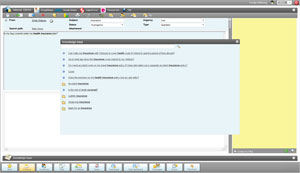
Kana Software is pushing into the mid-market space with a new offering called “Kana Express.”
It is a multi-channel Web customer service application divided into four modules, all of which can be deployed separately or used as a whole suite. Scaled-down versions of more robust customer service applications, the modules include a social application, a mobile application, a Web application and a customer interaction/agent application.
The modules consist of prepackaged functionality. For instance, the agent module includes email management, call management, live chat, white mail management, campaign management and proactive outbound marketing. The Web module provides functionality for Web self-service, including a virtual assistant.
Social includes listen and response, listening to email, functionality for Facebook and Twitter and a social community if the user wants to build its own community. Mobile focuses on mobile CRM including such features as online chat.
A centralized database is at the heart of all of these modules. It scans text in emails, chat sessions and Web self-service interactions, then spits out the relevant answers to queries and searches across channels. Other common attributes among the modules include reporting and analytic capabilities and server integration to better support connectivity between Kana Express and such front- and back-office functions and application as IVR, ACD, CTI, CRM, accounting and ERP.
Who It’s For
This new product is aimed at companies that have some form of CRM in place but are still fairly rudimentary in terms of being able to offer online customer service, James Norwood, CMO for Kana, told CRM Buyer.
“A typical customer would be online retailer. It doesn’t have a lot of money to put into online customer service, and that type of functionality might have even been an afterthought for years. Now, though, it is realizing that competitors’ services are a click away and that can’t be ignored.”
Pricing for Value
“Hence the multichannel approach. That way the retailer or small business can add value quickly in the areas that are most important to it.” One company might already be well versed in social, for example, and not need the module but has a significant gap in customer interaction.
Such companies, Norwood added, are still cost-conscious, though — a fact that Kana kept in mind when it designed its pricing for Express.
Customers are billed on an interaction basis — that is, they are charged based on how much they or their own customers use the Software as a Service deployed module or modules.
An interaction would be considered — for example, a search of the knowledge base for a particular answer to a question, or the sending of an email. “This way users know they are paying for the value they get out of the system and not a penny more,” Norwood said.
The package gives customers a certain number of interactions for a set fee. After that, the charge per interaction model kicks in. For the entire suite, Norwood estimated that an average customer would pay between US$40,000 to $60,000 a year, which also includes hardware and data center services.
The social and mobile are the cheaper modules, running about $10,000 each per year, according to Norwood. “The agent and Web modules are slightly more expensive than that,” he added.























































